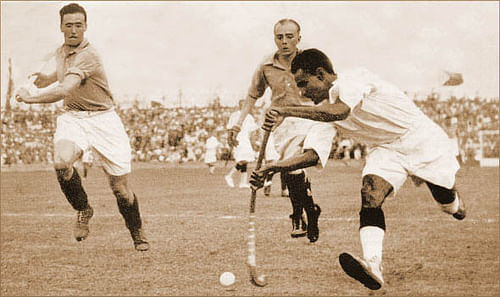
Needless to say, I am a common man - Remembering the 'wizard' Dhyan Chand
“Needless to say, I am a common man.”
Thus begin the opening lines of “Goal”, an autobiography of a certain Indian, modest in height and manners, almost as if he was weighed down by the astronomical deeds he did on the field with a few inches of curved wood over a 30-year long career.

Dhyan Chand
Everything in the living and dying of him was common, but what was by no means common were the feats that he scripted decades ago whose reverberations continue to regale everyone even now. So when the news of the late Dhyan Chand being nominated for Bharat Ratna ricocheted in the press recently, it was in many ways a triumph for this Allahabad-born “commoner”.
For a person whose career was sculpted by the black of moonlit nights and recompensed by the yellows of the Olympic golds, a Bharat Ratna merely inducts the Government of India into the Army Major’s fan club; just another colour amidst the black and yellow backdrop. An award or even a nomination cannot measure his 1000-plus goal tally apart from coyly emblazoning his epoch-making wizardry.
“Morning shows the day”, goes an old saying. As a fourteen-year-old, a fledgling by sporting standards, Dhyan accompanied his father to a hockey match played between two army teams composed of English officers. One of the teams was down by two goals. Dhyan repeatedly told his father that if given a hockey stick, he could make the trailing team win.
His father shushed him while a British army officer sitting nearby chipped in with some not-so-nice words about his “tall” claims, adding that he was still a child.
Dhyan Singh insisted on playing, and finally was given his moment in the sun. Dhyan grabbed many eyeballs after scoring 4 goals by the end of the match! So enamoured was the officer that he inducted Dhyan into the ‘Children’s Platoon’. The morning had well and truly shown the day.
After joining the Indian Army as a Sepoy in Delhi’s First Battalion of the Brahmin Regiment, Dhyan began spending a lot of time with his only indulgence, hockey. Major Bhole Tiwari, his Subedar, a skilled player himself, was one of Dhyan’s early mentors. He inculcated into Dhyan the need to fashion his game to fit the team-based dynamic of hockey. Dhyan’s flamboyance was manoeuvred and pruned to greatness as he began representing his regiment in the army events from 1922-1926.
The call of duty kept him occupied and only allowed him to play at night. So while his regiment rested at night, he was the solitary reaper as he practised alone on the field with a ball and a stick. While they rested, his colleagues could hear him sharpening his skills at night. The cacophony of the sounds was like an ode to a great Indian in the making. This was how Dhyan Singh grew into Dhyan Chand, because he used to practise the game under moonlight (chand meant moon in Hindi).
In the final of the Punjab Indian infantry tournament in Jhelum in 1925, Dhyan Chand’s team was two goals down with 4 minutes to go. He positioned the ball on his stick and scythed open the defence with a marvellous sprint to score a goal. Two more goals followed in the remaining time to cap a dramatic last minute victory for Dhyan Chand’s team. The aftermath of the match saw Dhyan Chand earning the nickname the “Hockey Wizard”.
Shortly thereafter, Dhyan Chand was selected to represent the Indian team on a tour to New Zealand in the year 1926. Co-incidentally, this was the first Indian team to represent the country in any sport abroad. The tour turned out to be a successful assignment both for India and Dhyan Chand.
On a whole, out of the 21 matches India played, they emerged victors on 18 occasions, drawing two and losing one in the process. The Indians scored a cumulative 192 goals while giving away a measly 24. Dhyan Chand scored more than a century of goals and won plenty of hearts too with his mesmerising dribbling.
A British Indian hockey team was fielded at the 1928 Amsterdam Olympics as Britain was not keen that India, then its colony, participate in the Olympics. England had won both the Olympic hockey golds till then. After rounds of consideration and appeals, the British allowed India’s entry as the British Indian hockey team.
For a fact, from 1928 till India won independence in 1947, Britain never participated in the same Olympic hockey tournament as India. The first encounter between India and Britain took place two decades later, in the 1948 Olympic hockey final at Wembley, London. India completed a 4-1 win over Britain to announce its dominance to the world.